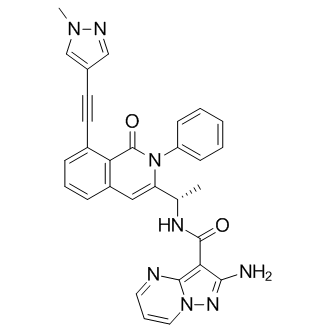All AbMole products are for research use only, cannot be used for human consumption.

In vitro: IPI-549 inhibits PI3Kγ with IC50 of 16 nM, with >100-fold selectivity over other lipid and protein kinases (PI3Kα IC50=3.2 μM, PI3Kβ IC50=3.5 μM, PI3Kδ IC50>8.4 μM). IPI549 is evaluated for activity across all Class I PI3K isoforms. The binding affinity of IPI549 for PI3K-γ is determined by measuring the individual rates constants and for PI3K-α, β and δ using equilibrium fluorescent titration. IPI549 is found to be a remarkably tight binder to PI3Kγ with a Kd of 290 pM and >58-fold weaker affinity for other Class I PI3K isoforms (PI3Kα Kd=17 nM, PI3Kβ Kd=82 nM, PI3Kδ Kd=23 M). In PI3K-α, -β, -γ, and -δ dependent cellular phospho-AKT assays, IPI549 demonstrates excellent PI3K-γ potency (IC50=1.2 nM) and selectivity against other Class I PI3K isoforms (>146-fold). Cellular IC50s for Class I PI3Kα (250 nM), PI3Kβ (240 nM), PI3Kγ (1.2 nM), PI3Kδ(180 nM) are determined in SKOV-3, 786-O, RAW 264.7, and RAJI cells, respectively, by monitoring inhibition of pAKT S473 by ELISA. Furthermore, IPI549 dose dependently inhibits PI3Kγ dependent bone marrow-derived macrophage (BMDM) migration. IPI549 is also found to be selective against a panel of 80 GPCRs, ion channels, and transporters at 10 μM. In vivo: IPI-549 demonstrates favorable pharmacokinetic properties and robust inhibition of PI3K-γ mediated neutrophil migration. In vivo (mice, rats, dog, and monkeys), IPI-549 has excellent oral bioavailability, low clearance, and distributed into tissues with a mean volume of distribution of 1.2 L/kg. Overall, IPI-549 has a favorable pharmacokinetic profile to allow potent and selective inhibition of PI3K-γ in vivo. The t1/2 of IPI-549 for mouse, rat, dog and monkey is 3.2, 4.4, 6.7 and 4.3 h, respectively. IPI-549 significantly reduces neutrophil migration in a dose dependent manner in this model when administered orally at all of the tested doses.

Tampere University. 2021.
Novel Targeted Therapies and Prognostic Markers for T Cell Acute Lymphoblastic Leukemia
IPI549 (Eganelisib) purchased from AbMole
| Molecular Weight | 528.56 |
| Formula | C30H24N8O2 |
| CAS Number | 1693758-51-8 |
| Solubility (25°C) | DMSO ≥ 15 mg/mL |
| Storage |
Powder -20°C 3 years ; 4°C 2 years In solvent -80°C 6 months ; -20°C 1 month |
| Related PI3K Products |
|---|
| T-00127-HEV1
T-00127-HEV1 is a phosphatidylinositol 4-kinase III beta (PI4KB) inhibitor with an IC50 of 60 nM. |
| PI3Kγ inhibitor AZ2
PI3Kγ inhibitor AZ2 is a highly selective PI3Kγ inhibitor (The pIC50 value for PI3Kγ is 9.3). |
| NIBR-17
NIBR-17 is a pan-class I PI3K inhibitor with suitable pharmacokinetic properties and inhibits tumor growth. |
| RV-1729
RV-1729 is an inhibitor of the phosphatidylinositol 3-kinase-δ (PI3Kδ). |
| Vulolisib
Vulolisib is a potent and orally active phosphatidylinositol 3-kinase (PI3K) inhibitor, with IC50 values of 0.2 nM, 168 nM, 90 nM and 49 nM for PI3Kα, PI3Kβ, PI3Kγ and PI3Kδ, respectively. |
All AbMole products are for research use only, cannot be used for human consumption or veterinary use. We do not provide products or services to individuals. Please comply with the intended use and do not use AbMole products for any other purpose.


Products are for research use only. Not for human use. We do not sell to patients.
© Copyright 2010-2024 AbMole BioScience. All Rights Reserved.
